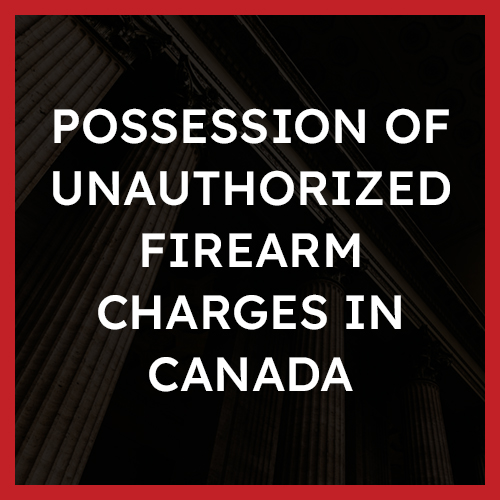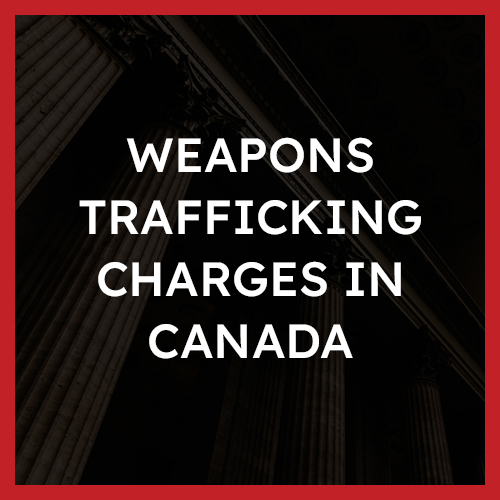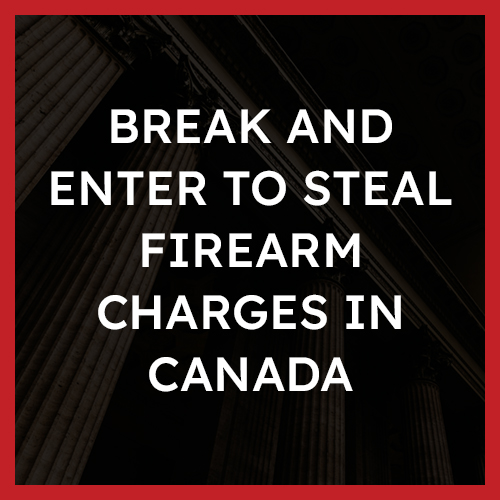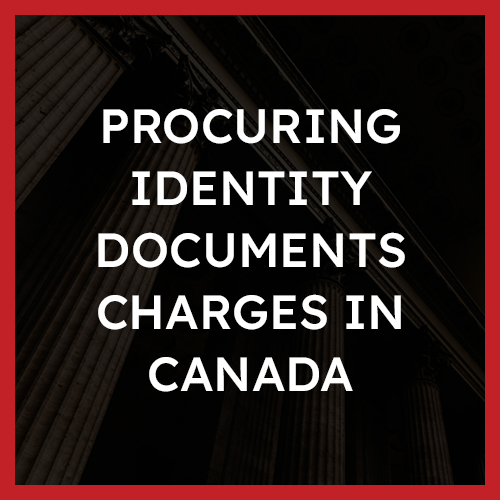Possession of Unauthorized Firearm (s. 92) charges in Canada: Offences, Defences, Punishments
What is a possession of unauthorized firearm charge?
 The offence of possession of unauthorized firearms is found under s.92 of the Criminal Code.
The offence of possession of unauthorized firearms is found under s.92 of the Criminal Code.
The offence of possession of unauthorized firearm is found in Part III of the Criminal Code relating to “Firearms and Other Weapons”.
Offences under s.92 of the Criminal Code are straight indictable offences.
Examples
Some examples of possession of unauthorized firearms may be the following:
- Having a gun and not having a licence for it
- Carrying ammunition without having a licence
- Having a restricted firearm and not being the holder of a registration certificate
Defences
- Identity;
- Essential elements of the offence are not met;
- No possession;
- 92(4) Defences; and
- Any applicable Charter
Punishment
Offences of unauthorized possession of a firearm are straight indictable offences. You may receive up to 10 years in jail if you are convicted.
However, other dispositions may be available to you as well.
Overview of the Offence
Under s.92 of the Criminal Code:
Subject to subsection (4), every person commits an offence who possesses a prohibited firearm, a restricted firearm or a non-restricted firearm knowing that the person is not the holder of
(a) a licence under which the person may possess it; and
(b) in the case of a prohibited firearm or a restricted firearm, a registration certificate for it.
Possession of prohibited weapon, device or ammunition knowing its possession is unauthorized
(2) Subject to subsection (4), every person commits an offence who possesses a prohibited weapon, a restricted weapon, a prohibited device, other than a replica firearm, or any prohibited ammunition knowing that the person is not the holder of a licence under which the person may possess it.
Punishment
(3) Every person who commits an offence under subsection (1) or (2) is guilty of an indictable offence and liable to imprisonment for a term of not more than 10 years.
Exceptions
(4) Subsections (1) and (2) do not apply to
(a) a person who possesses a prohibited firearm, a restricted firearm, a non-restricted firearm, a prohibited weapon, a restricted weapon, a prohibited device or any prohibited ammunition while the person is under the direct and immediate supervision of a person who may lawfully possess it, for the purpose of using it in a manner in which the supervising person may lawfully use it; or
(b) a person who comes into possession of a prohibited firearm, a restricted firearm, a non-restricted firearm, a prohibited weapon, a restricted weapon, a prohibited device or any prohibited ammunition by the operation of law and who, within a reasonable period after acquiring possession of it,
(i) lawfully disposes of it, or
(ii) obtains a licence under which the person may possess it and, in the case of a prohibited firearm or a restricted firearm, a registration certificate for it.
This means that in order for the Crown to convict you under s.92 of the Criminal Code they must prove, beyond a reasonable doubt, the actus reus, the mens rea and that you had possession.
The Guilty Act (Actus Reus)
The actus reus that the Crown has to prove, beyond a reasonable doubt, is that:
- You had a firearm;
- The firearm was prohibited, restricted, or a non-restricted firearm; and
- You were not authorized to have the firearm.
Under s.92(1)(a) and s.92(2) of the Criminal Code the Crown also has to prove that you were not the holder of a licence under which you may possess the firearm. Under s.92(1)(b) of the Criminal Code the Crown must prove that, in the case of a prohibited firearm or a restricted firearm, you were not a holder of a registration certificate for it.
The Guilty Mind (Mens Rea)
The mens rea that the Crown must prove, beyond a reasonable doubt, for the purpose of s.92(1)(a) of the Criminal Code is that:
- You knew or were wilfully blin to the fact that you were not a holder of such a license or registration.
For the purposes of s.92(2) ) of the Criminal Code the mens rea that the Crown must prove, beyond a reasonable doubt, is that:
- You knew that you were not the holder of a licence under which you may possess the firearm.
Possession
In addition to the actus reus and the mens rea, the Crown must also prove that you had possession of the firearm in question. This means that you must be aware that you had physical custody of the firearm, prohibited weapon, device or ammunition and you must be aware that it was either a firearm, prohibited weapon, device or ammunition.
Defences
Identity
The Crown needs to prove identity beyond a reasonable doubt. This means that the Crown must prove that it was you who committed the offence. This can often be difficult if there are no witnesses, if there were conditions present that prevented a witness from identifying you, or if the offence was captured by poor-quality surveillance footage. Sometimes mistakes do happen, the authorities could have made a mistake in identifying you as the perpetrator based on the poor quality of the footage. Your defence lawyer may be able to argue that the Crown cannot definitively prove that it was you who committed the offence, resulting in an acquittal.
Essential Elements of The Offence Are Not Met
In order for the Crown to convict you of an offence, the actus reus and the mens reas of the offence need to be proven beyond a reasonable doubt. If the Crown is unable to do so, the essential elements of the offence are not satisfied and you cannot be convicted of the offence.
Lack Of Possession
Along with the actus reus and the mens rea for the offence of pointing a firearm, the Crown also needs to prove that you did in fact possess the firearm. As such, if you are able to showcase that you did not have a firearm in your possession, the Crown will not be able to convict you of an offence of possession of unauthorized firearm.
s.92(4) of the Criminal Code defences
Under s.92(4) of the Criminal Code, you cannot be convicted of an offence under s.92 of the Criminal Code if the following apply to you:
- If you possess a prohibited firearm, a restricted firearm, a non-restricted firearm, a prohibited weapon, a restricted weapon, a prohibited device or any prohibited ammunition while you are under the direct and immediate supervision of a person who may lawfully possess it, for the purpose of using it in a manner in which the supervising person may lawfully use it;
- If you come into possession of a prohibited firearm, a restricted firearm, a non-restricted firearm, a prohibited weapon, a restricted weapon, a prohibited device or any prohibited ammunition by the operation of law and you, within a reasonable period after acquiring possession of it, either
(i) lawfully disposes of it, or
(ii) obtain a licence under which the person may possess it and, in the case of a prohibited firearm or a restricted firearm, a registration certificate for it.
Applicable Charter defences
The Charter sets out your rights before and after arrest. In the event the police fail to abide by these rights, you may have an applicable Charter defence to your charge:
Common Charter breaches include:
- Section 8 – Right to be secure from search and seizure;
- Section 9 – Right not to be arbitrarily detained;
- Section 10 – Right to be informed of reasons for detention or arrest:
- Section 11 – General: legal rights apply to those “charged with an offence”
- Section 12 – Cruel and unusual treatment or punishment
If any of your charter rights have been violated, you may be in a position to have any evidence obtained during the breach excluded.
Punishments
Offences under s.92 of the Criminal Code are straight indictable offences and you can receive up to 10 years in jail.
However, the following dispositions may also be available to you:
- Discharge;
- Suspended sentence;
- Stand-alone fine;
- Custody and probation;
- Custody and fine; and
- Conditional sentence order.
It is important to note that if the offence involves the use of a weapon, there is no conditional sentence available. Additionally, if you have one or more prior convictions, there is no discharge of conditional sentence available.
Frequently Asked Questions
What is the sentence for unauthorized possession of a firearm in Canada?
Offences of unauthorized possession of a firearm are straight indictable offences:
- For a first offence= up to 10 years in jail
- For a second offence= up to 10 years in jail; minimum of one year in jail
- For third or subsequent offences= up to 10 years in jail; minimum of two years in jail
Can you possess a firearm without a PAL?
Under s. 91(1) of the Criminal Code, it is illegal to possess a firearm without having a license. Additionally, if the firearm is considered to be restricted, the license must be accompanied by a registration certificate. However, an exception to unauthorized possession maybe if you possess a firearm under the direct supervision of the lawful owner and operator of the firearm.
How serious is a gun charge in Canada?
A gun charge is a serious offence in Canada and is prosecuted harshly. Even if you are convicted for a first offence you may receive jail time.
Published Decisions
R v Monaghan, 2022 ABPC 105
This case concerned an application by Monaghan for exclusion of evidence from search pursuant to s. 24(2) of the Canadian Charter of Rights and Freedoms. Monaghan was charged with seven offences including, careless storage of a firearm, carrying a concealed weapon, possession of a firearm knowing its possession was unauthorized, unauthorized possession of a firearm in a motor vehicle, possession of a loaded firearm, possession of cocaine and possession of methamphetamine. The defence submitted that Monaghan was arbitrarily detained, and that the search of his motor vehicle was not authorized by law. The defence also submitted that the vehicle keys, loaded firearm and controlled substances, located by the police in the vehicle, along with the statement made by Monaghan to the police after his unlawful arrest ought to be excluded from evidence.
You can read the full decision here.
R v Chol, 2022 ABPC 41
This case concerned the sentencing of Chol for intentionally discharging firearm, dangerous driving and flight after being pursued by police. Chol was also charged for possession of a firearm while prohibited by Court order, and two charges of breach of a release order. After consuming alcohol and drugs, Chol fired at an occupied single-family home with the knowledge that the home was occupied. For the unauthorized possession of a weapon charge, Chol was ultimately sentenced two years in jail.
You can read the full decision here.
R v Brayton, 2021 ABCA 316
This case was an appeal by the accused, Brayton, from a conviction for drug and weapon offences. Police conducted a routine traffic stop of the accused’s vehicle. Police observed a baton on the driver’s seat of the vehicle and believed the accused acted nervously while trying to conceal something under his leg. Police arrested the accused for possession of a prohibited weapon. Following the arrest, a search of the vehicle resulted in the seizure of ketamine hidden in a can, cash, three cell phones, two batons, pepper spray, and two sets of brass knuckles. The accused sought exclusion of the evidence based on a breach of his Charter rights on the basis that the baton was not a prohibited weapon and therefore the arrest was unlawful. Ultimately, the accused was convicted of possession for the purpose of trafficking, two counts of possession of a prohibited weapon, and three counts of possession of a weapon for a dangerous purpose.
You can read the full decision here.
About The Author
Ask A Question
We endeavor to respond to questions within 24 hours. If your matter is urgent, please call our office or submit a request for a free consultation.







